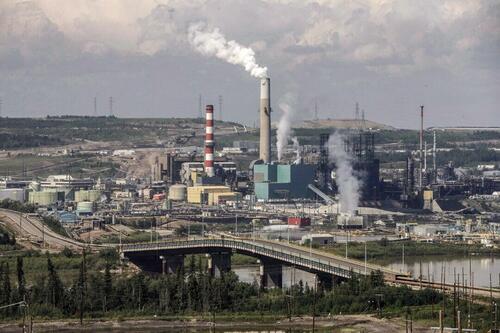Authored by Marco Navarro-Génie via The Epoch Times,
Calls for Canada to respond aggressively to U.S. trade threats ignore the economic realities of such a move. Consider Quebec and Alberta energy. The stakes for Alberta and Quebec in this morbidly anticipated trade-war gamble are profoundly asymmetric, with Alberta standing to lose far more in absolute terms and per capita. The arguments to engage in such conflict are reckless and fail to recognize the magnitude of our economic integration with the United States.
Canada and the United States share one of the world’s most extensive and intertwined trading relationships. In 2022, bilateral trade in goods and services exceeded $900 billion annually. Canada exported 75 percent of its goods to the United States. Beyond trade, bilateral investment is immense, with over $1 trillion in two-way direct investment (All amounts in Canadian dollars).
A trade war would jeopardize trade and these capital flows, which are critical for businesses and public finances. Retaliatory tariffs or export restrictions would destabilize relationships and harm key industries across Canada. During the 2018 NAFTA renegotiations, even the spectre of a trade breakdown cost Canadian industries millions in lost revenue and opportunities. A full-blown trade war would magnify these damages exponentially.
Alberta’s oil and gas sector is the backbone of its economy and a vital contributor to Canada’s prosperity. In 2023, Alberta exported $127 billion worth of oil and gas to the United States, representing 82 percent of its energy exports. This sector accounts for 27 percent of Alberta’s GDP and contributes approximately $28,863 per capita to the provincial economy.
Halting these exports would be harmful to a weakened economy. Alberta’s energy industry supports tens of thousands of jobs and generates substantial government revenues that fund social programs and infrastructure. Alberta is also a net contributor to federal equalization payments, providing billions annually to support less prosperous provinces, including Quebec.
The suggestion that Alberta should stop exporting oil and gas to “do its part” for Canada is economically nonsensical. Unlike Quebec’s electricity sector, Alberta’s energy industry has no immediate alternative markets to replace U.S. demand. Shutting off the tap to America would devastate Alberta and weaken Canada.
In contrast, Quebec’s hydroelectric sector, though significant, plays a smaller role in its economy than oil and gas do in Alberta. In 2022, Hydro-Québec exported $3 billion worth of electricity to the U.S., representing about 12 percent of its total electricity production and 2.9 percent of its GDP. With a population of 8.6 million, these exports amount to $349 per capita.
While losing U.S. electricity exports would hurt Quebec, the economic impact would be far less severe than Alberta’s potential losses. Quebec’s export economy is more diversified, with industries like aerospace, aluminum, pharmaceuticals, and technology providing alternative revenue streams.
The notion that Alberta and Quebec will equally shoulder the burden of a trade war by withholding energy sales to the United States is deeply flawed. Alberta’s reliance on the U.S. market is far greater, and its potential losses are higher. This is partly because Quebec objected to Energy East, the proposed pipeline to carry Alberta energy to Atlantic waters. Halting oil and gas exports would cost Alberta almost 10 times more per capita than it would cost Quebec.
This asymmetry highlights the uneven stakes in any trade conflict. Asking Alberta to sacrifice its economy while Quebec faces minor losses is unfair, economically irrational, and deeply corrosive to national unity. Undermining Alberta’s economy would have repercussions far beyond the province’s borders.
Far from being “anti-Canadian,” as suggested by people with a political agenda to hurt Alberta, Alberta’s reluctance to dismantle its energy sector is a defence of Canada’s broader economic interests. The province’s contributions to federal revenues and equalization payments help sustain national programs that benefit all Canadians. Conversely, Quebec’s relative insulation from the harmful consequences of a trade war explains its more relaxed stance.
For Quebec, halting exports would be akin to a paper cut whereas for Alberta, it would be a lethal wound.
Canada’s strength lies in its economic diversity and regional contributions. Alberta’s oil and gas sector, Quebec’s hydroelectric industry, Atlantic fisheries, and Ontario’s manufacturing base are all critical to the country’s prosperity.
A trade war would disrupt this relationship and risk Canada’s position as a stable and reliable trading partner. Premier Danielle Smith alone has offered a mature and reasonable approach.
The idea of a trade war with the United States is reckless when Canada’s government is in stasis and already mired in the economic problems it created.
Rather than pitting provinces against one another, Ottawa (and the premiers spoiling for a fight) should focus on preserving a proven key to our prosperity: strengthening its relationship with the United States.
